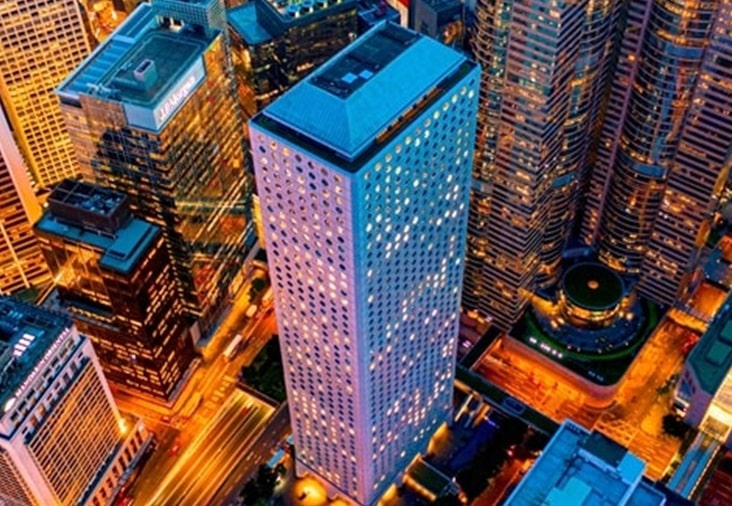Tomorrow’s CENTRAL project marks a milestone in sustainable urban redevelopment and circular economy innovation
HONG KONG SAR, October 27, 2025 — In a landmark step toward circular construction, Hongkong Land has become the first developer in Hong Kong to introduce a large-scale solution for recycling tempered and laminated glass waste from commercial buildings. The breakthrough, developed in partnership with Gammon Construction and The Hong Kong Polytechnic University (PolyU), transforms previously unrecyclable demolition glass into low-carbon building materials — establishing a new model for sustainable urban renewal.
Unveiled as part of the company’s flagship Tomorrow’s CENTRAL redevelopment project, the initiative marks a defining moment for Hong Kong’s property and construction sectors, which face mounting challenges in waste management and decarbonisation.
“Tomorrow’s CENTRAL represents a visionary step in sustainable innovation amid a global and local waste issue that requires immediate attention,” said Michael Smith, CEO of Hongkong Land. “At Hongkong Land, we’re committed to building a circular economy — one where waste is not a burden but a resource. This project advances the future of climate-resilient construction by delivering scalable, replicable models that will shape construction practices in Hong Kong and beyond.”
Closing the Loop on Construction Waste
The innovation at Tomorrow’s CENTRAL — a comprehensive redevelopment of Hongkong Land’s LANDMARK retail portfolio — demonstrates a closed-loop circular economy in action. By converting demolished tempered and laminated glass into partition blocks and low-carbon cement alternatives, the project ensures that materials are reused within the same site, minimising landfill waste and reducing the carbon footprint associated with sourcing virgin materials.
The initiative is pivotal to achieving Tomorrow’s CENTRAL’s 75% waste diversion goal, aligning with global sustainability certifications such as LEED and BEAM Plus. This comes at a time when Hong Kong’s landfill sites are expected to reach capacity by 2026, underscoring the urgency of waste diversion and material recovery in the city’s construction sector.
Kevin O’Brien, Chief Executive of Gammon Construction, highlighted the power of industry collaboration: “Sustainability must be embedded from the earliest stages of construction. As the main contractor for Tomorrow’s CENTRAL, we are proud to support Hongkong Land’s bold vision by identifying circular solutions for demolition materials. This partnership with PolyU shows how innovation and collaboration can drive industry-wide change — reflecting our sustainability strategy, United Ambitions.”
Professor Chi Sun Poon, Distinguished Research Professor and Director of the Research Centre for Resources Engineering towards Carbon Neutrality (RCRE) at PolyU, added: “Our research team is proud to be part of this groundbreaking initiative, which will transform how tempered and laminated glass waste is handled. This technology is set to make a far-reaching impact on Hong Kong’s construction industry and beyond.”
Innovation Born from Urgency
Globally, construction consumes more than 30% of natural resources and generates roughly 30% of all waste. In Hong Kong, construction and demolition debris accounts for nearly 20% of total landfill intake — a statistic that spurred Hongkong Land’s early intervention.
During the project’s pre-construction phase, Gammon’s audit revealed over 50 tonnes of glass from shopfronts, façades, and curtain walls destined for demolition — with no existing recycling infrastructure to manage it. Tempered and laminated glass, common in modern façades, are composite materials that are difficult to separate and recycle, typically ending up in landfills.
Recognising the environmental stakes, Hongkong Land convened academia and industry to co-develop a first-of-its-kind recycling method that converts these materials into low-carbon concrete blocks certified for use under Hong Kong’s Buildings Department standards. The partnership also demonstrates how public-private-academic collaboration can translate sustainability goals into commercially viable solutions.
A Milestone in Circular Construction
The adoption of tempered and laminated glass recycling is expected to be rolled out across Hongkong Land’s portfolio and Gammon’s projects by 2026, with PolyU set to publish findings that will serve as a global reference framework for sustainable construction practices.
The initiative aligns with Hongkong Land’s broader 2030 Sustainability Framework, which targets diverting 50% of commercial waste and 60% of construction waste by the end of the decade. Achieving this requires full alignment across its supplier network, guided by the company’s Sustainable Procurement Policy and Supplier Code of Conduct.
Tomorrow’s CENTRAL exemplifies this approach — integrating sustainability from pre-construction design through to materials reuse and site execution. Beyond waste reduction, the system provides a scalable economic model for material recovery, offering incentives for recycling that can be replicated across Hong Kong’s aging building stock.
Hongkong Land owns and manages over 850,000 sq. m. of premium mixed-use real estate across Hong Kong, Singapore, and Shanghai, and its properties are consistently recognised with industry-leading green building certifications. In Hong Kong, its Central portfolio spans 450,000 sq. m., housing some of the world’s foremost companies and luxury brands.
The Tomorrow’s CENTRAL redevelopment — part of a US$1 billion expansion of the LANDMARK retail portfolio — embodies the Group’s long-term vision to redefine sustainability in urban real estate while preserving Hong Kong’s status as a global hub for commerce, culture, and design.
Hongkong Land Holdings Limited is incorporated in Bermuda, with a primary listing on the London Stock Exchange and secondary listings in Bermuda and Singapore. The company is a member of the Jardine Matheson Group.
As Hong Kong seeks to accelerate its progress toward carbon neutrality by 2050, initiatives like the Tomorrow’s CENTRAL glass recycling programme illustrate how circular construction can transform the urban landscape. By turning waste into resources and collaboration into climate action, Hongkong Land and its partners are not only reshaping skylines — they’re reengineering the sustainability blueprint for cities of the future.

